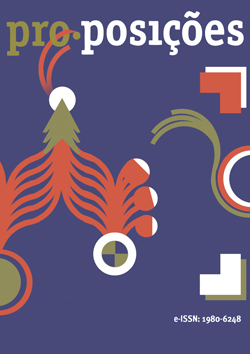Abstract
This article aims to explore Rancière’s thesis that raises the inversion of traditional critical theory and therefore critical thinking. For this he analyzes the four arguments elaborated by the philosopher, and points out the need to propose another form of critical thinking away from the model of the logic of denunciation and the incapacity and ignorance of the masses. Finally we reflect on some of the political consequences of practicing this renewed way of thinking critically.
References
Althusser, L. (1988). La filosofía como arma de la revolución. Buenos Aires: Siglo XXI.
Biesta, G. (2010). A new logic of emancipation: the methodology of Jacques Rancière. Educational Theory, 60(1), 39-59. doi:10.1111/j.1741-5446.2009.00345.x .
Bingham, C., & Biesta, G. (2010). Jacques Rancière: education, truth, emancipation. London: Bloomsbury.
Cerletti, A. A. (2003). La política del maestro ignorante: la lección de Rancière. Revista Educación y Pedagogía, 15(36), 143-151.
Corcuff, P. (2019). De la posible renovación de la teoría crítica en Francia: entre desventuras académicas y tensiones Bourdieu/Rancière. Revista de Ciencias Sociales, 32(44), 61-80. Recuperado de http://www.scielo.edu.uy/scielo.php?script=sci_arttext&pid=S0797- 55382019000100061&lng=es&nrm=iso
Galloway, S. (2012). Reconsidering emancipatory education: staging a conversation between Paulo Freire and Jacques Rancière. Educational Theory, 62(2), 163-184. doi:10.1111/j.1741-5446.2012.00441.x
Kant, I. (2013). Crítica de la razón pura. Buenos Aires: Siglo XXI. Means, A. (2011). Jacques Rancière, education, and the art of citizenship. Review of Education, Pedagogy, and Cultural Studies, 33(1), 28-47. doi:10.1080/10714413.2011.550187
Merleau-Ponty, M. (1981). La estructura del comportamiento. Ciudad de México: FCE.
Patiño Niño, D. M. (2017). La noche de los proletarios de Jacques Rancière como posibilidad para pensar en otro tipo de comunidad. Universitas Philosophica, 34(68), 243-262. doi:10.11144/Javeriana.uph34-68.npjr
Rancière, J. (1996a). El desacuerdo. Buenos Aires: Nueva Visión. Rancière, J. (1998). La noche de los proletarios. Buenos Aires: Nueva Visión.
Rancière, J. (2003). El maestro ignorante. Barcelona: Laertes. Rancière, J. (2009). Sobre la importancia de la teoría crítica para los movimientos sociales actuales. Estudios Visuales, (7), 81-90. Recuperado de https://dialnet.unirioja.es/servlet/articulo?codigo=6824455
Rancière, J. (2010). El espectador emancipado. Buenos Aires: Manantial. Rancière, J. (2011). El tiempo de la igualdad. Barcelona: Herder

This work is licensed under a Creative Commons Attribution 4.0 International License.
Copyright (c) 2020 Pró-Posições


